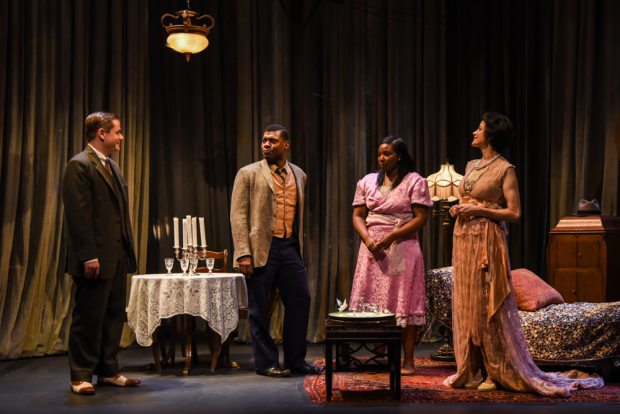

The Glass Menagerie, the semi-autobiographical "memory play" that launched the career of Tennessee Williams, takes place in a fragile space, presided over by an omniscient family photo and a narrator, Tom Wingfield (Richard Prioleau), who admits to the unreliability of his recollections. Memory is subjective and discriminatory and yet Tom wanders persuasively through his familial past in 1930s St. Louis. He is an aspiring writer, tormented by his home-life and his dreary warehouse job. His overbearing mother, Amanda (Saundra Santiago), is skeptical of Tom’s alleged, frequent visits to the movies. Night after night, he returns home late and drunk. Like his father, an absent character who nevertheless makes his distant presence felt, he wishes to escape. Tom is at the center of conflict, though he longs for something beyond the walls he shares with his mother and sister. Amanda Wingfield, matriarch and Southern belle, inhabits melodrama with the same zeal as she does the frocks of her debutante youth. She is both scrupulous and doting. Tom’s older sister Laura (Olivia Washington), limping and painfully shy, devotes herself to playing records and admiring her precious collection of glass animal figurines, her ‘menagerie’. These represent the limits of her commitment, but for an unrequited passion for a popular boy she barely knew, whose high school accomplishments she keeps as mementos. In the second act, this same young man, Jim O’Connor (Doug Harris), appears as a guest at the apartment, summoned by Tom, his co-worker, who has been coaxed by his mother into finding a potential gentlemen caller for Laura. Jim is no longer the high school overachiever. Disappointed by the hardships of life’s upward struggle, he is nevertheless ambitious. He strives for better things and in a poignant exchange with Laura, he encourages her to think of herself as extraordinary. This powerful scene, however, proves bittersweet.
In this non-profit Masterworks Theater Company production at the 47th Street Theater, director Christopher Scott presents a compelling assemblage of repressed desires and amusing asides with subtly nuanced performances. The set alludes to the elements of loss and obsession while the lighting cleverly guides the audience through various dramatic inclinations. Santiago, helped in no small part by dialogue that is so often engaging and funny, gives a spectacular performance. Here is an actress who understands how to communicate pathos through silence, just as much as words. Prioleau expresses the frustrations of the son with a commanding physicality that struggles against the tethers of his family. Washington's performance is heartbreaking and vulnerable while Harris provides an impressive dose of optimism during a period in which it is most welcome. This is a commendable production and a must-see.